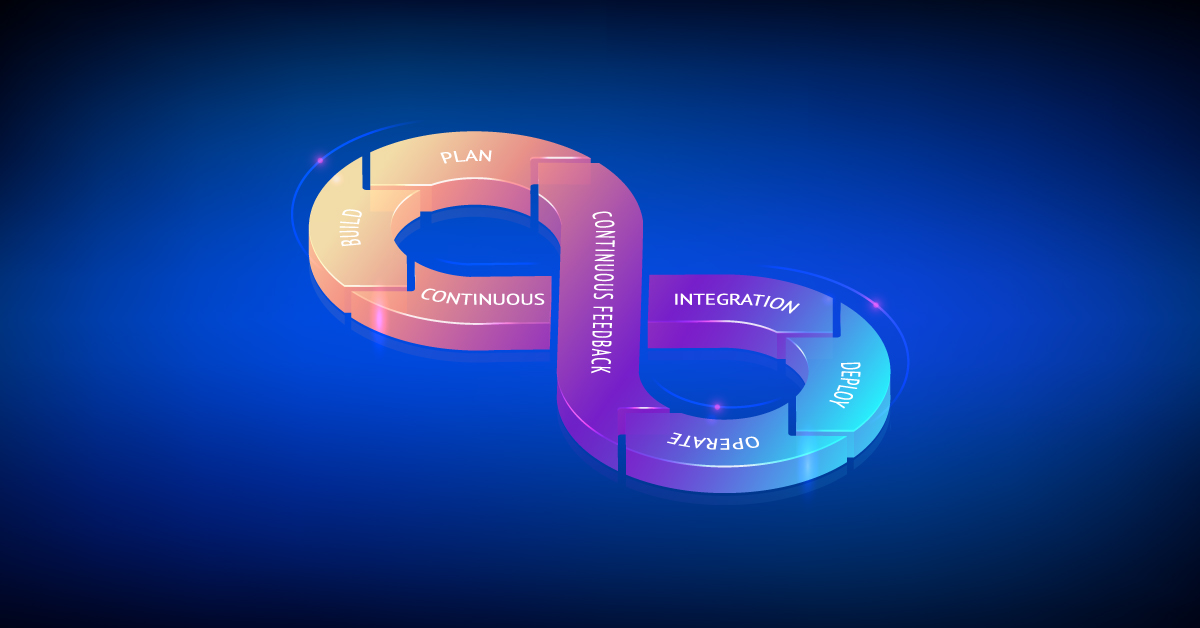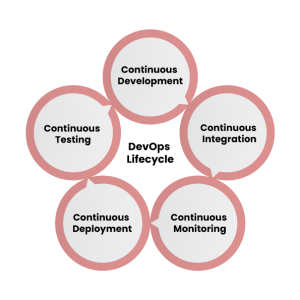DevOps and Digital Transformation
INTRODUCTION
Leading IT organizations are rapidly implementing digital transformation that encompasses all the sections of their company. But they are at a loss as to where to begin and speculate whether they have achieved their targets. Digital transformation demands organizations to innovate constantly, deploy applications rapidly and accelerate time to market. Organizations that can quickly transform ideas into products, incorporate customer feedback and then fine-tune their software in line with the improvements are the ones that will excel in a world that is moving at digital speed. DevOps is the answer to this: DevOps is a methodology that provides these organizations with the ability to deliver new ideas quickly. Organizations adopt DevOps for sustained continuous development, integration, and innovation it offers.
What is DevOps?
DevOps refers to a collaborative relationship between the Development and Operations of an IT enterprise, that leads to a quick flow of work. It enhances the reliability and stability of the various IT processes. DevOps is especially crucial for companies that have many releases and updates on their products. Such rapid releases allow the development teams to attain user feedback frequently. This is what is referred to as continuous deployment/delivery. The focus of DevOps is on achieving business value through the continuous delivery of applications that meet customer needs.
The DevOps Life Cycle:
A single team of engineers are responsible for the product/ service development. They manage the entire life-cycle of the product development right from requirement gathering to development ,testing , deployment of the application and lastly monitoring and obtaining requirement from the end user to implement their feedback in the next cycle of the product.
This is similar to a never-ending cycle of constant improvement and activity: hence the logo of DevOps is an infinity symbol. DevOps is a software approach that reduces the development lifecycle while implementing features and updates frequently, in line with business objectives.The Development and Operations teams were traditionally siloed, but DevOps closed the loop between both with its unique approach.
DevOps Lifecycle: The different phases
The DevOps lifecycle consists of five phases, namely:
1.Continuous Development: It is the phase during which developers form a vision of the project. Team members discuss each step of the project with a clear vision on the outcomes of the project and its deliverables. They begin to plan and develop the code for the project. The developed code is then maintained using tools like Git, Jira, and CVS.
2.Continuous Testing: The developed code is then tested continuously to detect bugs or any flaws. Apart from this, the application’s usability is tested, and it is also ascertained whether it meets the client’s specifications. Automation tools like Selenium are used for testing, and in case a flaw is detected, it is rectified in the next iteration.
3.Continuous Integration: A practice whereby developers frequently merge their code changes in a central repository. The key objective of this phase is to improve application quality and release new software updates. It automatically runs tests on recent code changes to detect errors.
4.Continuous Deployment: The developed code is deployed to the server side in such a way that it does not affect the performance of the application. It is essential to ensure that the code is correctly deployed on all servers without any issues.
5.Continuous Monitoring: A critical stage of the life cycle where the performance of the application is continually monitored. This phase involves recording and processing of vital information about the application. From this data, the operational efficiency is gauged and continuously improved.
Why implement DevOps in your enterprise
According to Allied Market Research, the global DevOps market is estimated to reach 9.4 billion dollars by 2023, with a CAGR of 18.7%. DevOps is not merely a technology but a thinking approach that is focused on automation of various processes within the development and IT operations. Here are some of the benefits that arise out of implementing DevOps in your enterprise:
Agility:
Businesses can achieve agility with DevOps- By gaining real-time feedback from users, developers can produce improved code with a lower turnaround time. DevOps owes its agility to the close relationship between the Development and Operations side, constant communication, and efficiency in performing tasks. By working on the same platform and utilizing the same tools, many barriers between both have been reduced by a great extent.
Reliability:
Reliability and on-time delivery is a crucial factor for many customers. Following a DevOps approach ensures this: Larger projects are broken down into smaller components- Each component having its own functionality. These components are delivered at a specified pace. By enabling changes to be incorporated easily, projects can be delivered in predefined stages.
Reducing Bottlenecks:
When the development and operations team work collaboratively. Both will have a clear understanding of the lifecycle from end to end. Members from both teams can work towards fixing flaws, or they can be informed about the areas that need improvement. Highly specialized professionals work to identify and rectify the bottlenecks of a project, thereby reducing the wait times significantly.
Automation:
There is a myriad of repetitive tasks within a particular process that leads to redundancy. Precious time is spent on these tasks. DevOps practices enable automation of deployments and testing. This eliminates repetitive tasks from the daily routine and lets employees give importance to innovation. So, DevOps is useful for individuals and puts greater value into their skill sets.
Customer Satisfaction:
Better usability, reliability, and agility, all combined would be advantageous to the customer. Shorter release cycles and on-time deployment are also additional factors that drive customer satisfaction. Through DevOps, Enterprises can tailor the product according to the customer’s need and incorporate A/B testing on different customer groups to test different versions of the product.
DevOps is being implemented at a rapid pace across the IT industry. With its advantages of on-time application delivery, stable operating environments and performance focussed teams, DevOps fosters a culture of innovation within the enterprise, accelerating its transformation to the digital. Reach out to us at DevOps@ndz.ae to learn more about how DevOps can work for you!





